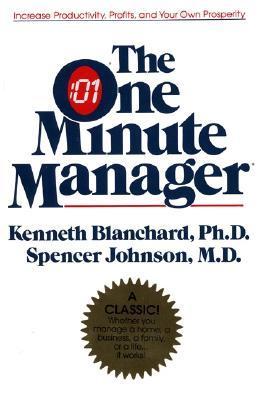
1 Line Summary
“The One Minute Manager” is a book written by Ken Blanchard and Spencer Johnson that provides practical strategies for managing people effectively.
What Will You Learn
Here are some benefits of reading the book, you’ll learn how to:
- set clear expectations and goals for your team.
- give effective feedback and praise.
- deal with problems and conflicts in a constructive way.
- create a positive work environment where people feel valued and appreciated.
Best Quotations from the Book
- “Catch people doing something right.”
- “The One Minute Reprimand.” If someone on your team makes a mistake, it’s important to address it promptly.
- “People who feel good about themselves produce good results.” When people feel valued and appreciated, they’re more likely to be motivated and productive.
- “Management is not a spectator sport.” This is a reminder that managers need to be involved in the day-to-day activities of their team. They can’t just sit back and delegate everything. Managers need to be hands-on and engaged in order to be effective.
- “Management is not a popularity contest.” It’s important to be fair and objective when managing your team. It’s important to remember that you’re making the decision for the good of the team, not for your own personal gain.
Key Takeaways
Here are some of the key takeaways from the book:
1. One Minute Goal Setting
“One Minute Goal Setting” is a concise yet powerful technique outlined in “The One Minute Manager.” It involves three simple steps that can be implemented swiftly and effectively.
- Agree on Goals: Begin by engaging in a brief conversation with your team member to set clear and achievable goals. Keep the discussion focused and concise. Define what is expected, ensuring both parties have a mutual understanding.
- Confirm Understanding: Confirm that the individual comprehends the goals and their significance. Make sure they are aware of the specific outcomes that are expected and the timeline for completion.
- Regular Feedback: Keep the lines of communication open. Regularly provide feedback and assess progress toward the goals. This helps ensure that the team member remains on track and can make any necessary adjustments to achieve the desired results.
2. One Minute Praising
The “One Minute Praising” technique emphasizes immediate and specific positive feedback, fostering a culture of recognition and motivation.
- Observe and Catch: Continuously observe your team members’ actions and achievements. When you notice a praiseworthy accomplishment, take a moment to acknowledge it.
- Prompt and Specific Praise: Offer sincere praise promptly. Mention the specific behavior or action that led to the success. Be genuine in your appreciation and make the team member feel valued.
- Reinforce Positive Behavior: By recognizing and praising positive actions, you reinforce the desired behavior and motivate team members to continue excelling. This contributes to a positive work atmosphere and increased productivity.
3. One Minute Reprimand
“The One Minute Reprimand” is a constructive approach to addressing mistakes while maintaining a supportive relationship.
- State the Specific Behavior: Address the mistake directly and succinctly. Be clear about what behavior was wrong, avoiding personal attacks. Focus solely on the action.
- Explain Impact: Help the individual understand the consequences of their behavior on the team, organization, or project. Highlight how the mistake affects overall goals and outcomes.
- Offer Correction: Provide the opportunity for the person to correct their behavior. Express your belief in their ability to improve and make better choices in the future. Reinforce that mistakes are opportunities for growth and learning.
4. The One Minute Manager’s Role
- Embrace a balanced leadership style that combines goal-setting, praising, and reprimanding effectively.
- Empower your team members to take ownership of their work while providing support and guidance.
- Foster a collaborative environment based on mutual respect and trust.
5. Leadership and Development
- Invest time in developing your team’s potential.
- Continuously provide feedback and guidance to help team members grow and excel.
- Promote a learning culture that encourages self-improvement and continuous development.
Situational Leadership:
- Tailor your leadership style to match the development level of each team member.
- Adjust your approach based on their competence and commitment to a task or project.
- Provide the appropriate amount of direction and support to help team members succeed.
Empowerment and Delegation:
- Delegate tasks and responsibilities while providing the necessary resources and support.
- Trust your team members’ abilities and allow them to make decisions and contribute meaningfully.
- Encourage a sense of ownership and accountability among team members.
6. Managing Change
- Embrace change as an opportunity for growth and improvement.
- Communicate openly with your team about changes and involve them in decision-making whenever possible.
- Lead by example during times of change to inspire confidence and maintain morale.
7. Building Effective Teams
- Create a collaborative and cohesive team environment by fostering open communication and mutual respect.
- Encourage team members to support each other’s growth and success.
- Recognize and celebrate team achievements to strengthen camaraderie.
If you’re a manager who wants to improve your team’s performance, then you need to read “The One Minute Manager”. This book is packed with practical advice and insights that will help you get the best out of your team in just 3 minutes a day.
Refer Related Summaries:
- “The 360-Degree Leader”,
- “How to Lead Smart People”,
- “Extreme Ownership”,
- “Dare to Lead”,
- “The 4 Disciplines of Execution”,
- “The Five Dysfunctions of a Team” and
- “Relation between Self Awareness and Effective Leadership“


Very informative and helpful in building effective teams
Very informative and helpful in building effective teams.